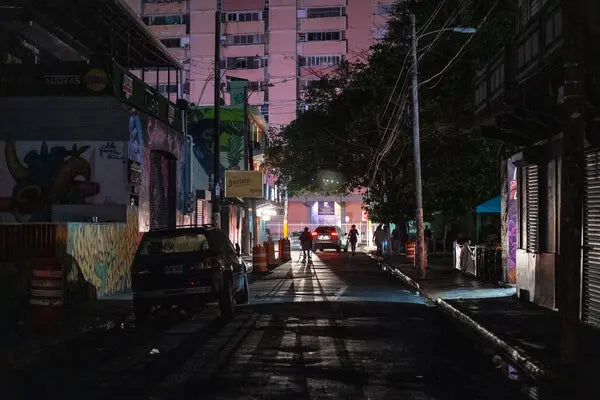
Puerto Rico Faces Widespread Blackout on New Year’s Eve, Affecting Over 1.3 Million Residents
Share
Puerto Rico Faces Widespread Blackout on New Year’s Eve, Affecting Over 1.3 Million Residents
On New Year’s Eve, Puerto Rico, a U.S. territory, was thrust into darkness as a massive power outage affected nearly 90% of the island’s population. The blackout, which left over 1.3 million households without electricity, disrupted essential services and created widespread chaos just as the island was preparing to ring in the new year.
The outage struck in the early hours of the morning, causing a complete shutdown of electrical appliances, air conditioning, and lighting for most residents. By late afternoon, about 194,000 customers—including critical services like hospitals and the Puerto Rico Aqueduct and Sewer Authority—had their power restored. However, the website tracking the locations of outages remained down, adding to the confusion and frustration.
Luma Energy and Genera PR, the private companies responsible for power generation and distribution in Puerto Rico, have been under intense scrutiny following the blackout. Luma Energy indicated that the cause of the outage was likely a failure of an underground power line, though full restoration of power could take up to 48 hours.
Growing Frustration and Political Responses
The blackout has reignited long-standing frustrations with Puerto Rico’s energy infrastructure, which has been plagued by chronic instability. Governor-elect Jenniffer González-Colón, who is set to be sworn in on January 2, took to social media to call for urgent reforms. She urged the creation of an energy czar to investigate potential breaches of contract by Luma and explore the possibility of replacing the current operators. González-Colón emphasized that stabilizing Puerto Rico's energy grid would be her top priority.
“We can’t keep relying on an energy system that fails our people,” she wrote, highlighting the urgent need for action on the island's power grid.
Governor Pedro Pierluisi, who remains in office until January 2, also voiced concerns and demanded immediate answers from the power companies. President Joe Biden was briefed on the situation, and U.S. Energy Secretary Jennifer Granholm offered federal assistance to address the crisis.
Impact on Daily Life and Businesses
The effects of the blackout were felt across Puerto Rico. Many businesses, malls, and government agencies were forced to close, with some services operating on limited schedules. Luis Muñoz Marín International Airport, the island's main airport, continued to operate using backup generators, but disruptions were reported. Hotels with generators were largely unaffected, but short-term rentals without backup power experienced a surge in cancellations.
The tourism industry was also impacted, with Discover Puerto Rico, a non-profit organization promoting the island as a travel destination, warning travelers about the power outage. They advised passengers on cruise ships to contact their operators directly for updated travel information.
A Fragile Power Grid: A Legacy of Hurricane Maria
Puerto Rico’s power grid has long been in a fragile state, struggling to recover from the catastrophic damage caused by Hurricane Maria in 2017. Years of neglect, underinvestment, and mismanagement have only worsened the situation. Puerto Rico's electrical system remains highly dependent on fossil fuels, with about 60% of the island's energy generated by petroleum, followed by natural gas and coal. In contrast, solar energy contributes only about 7% of the island’s electricity, despite significant efforts to promote renewable energy sources.
The Puerto Rico Electric Power Authority (PREPA), which oversees the island’s power grid, is also grappling with over $9 billion in debt. The island’s energy infrastructure continues to rely heavily on generators provided by the U.S. Federal Emergency Management Agency (FEMA), underscoring the ongoing vulnerability of the system.
As Puerto Rico looks toward a new year, the events of this New Year’s Eve serve as a stark reminder of the pressing need for comprehensive reform and investment in the island's energy infrastructure. The public outcry, combined with political pressure, may push for changes that could reshape Puerto Rico’s approach to energy in the years to come. However, it remains to be seen whether the current power companies will be held accountable or if significant changes will be made to ensure a more reliable energy future for the people of Puerto Rico.
Main Source: RT News